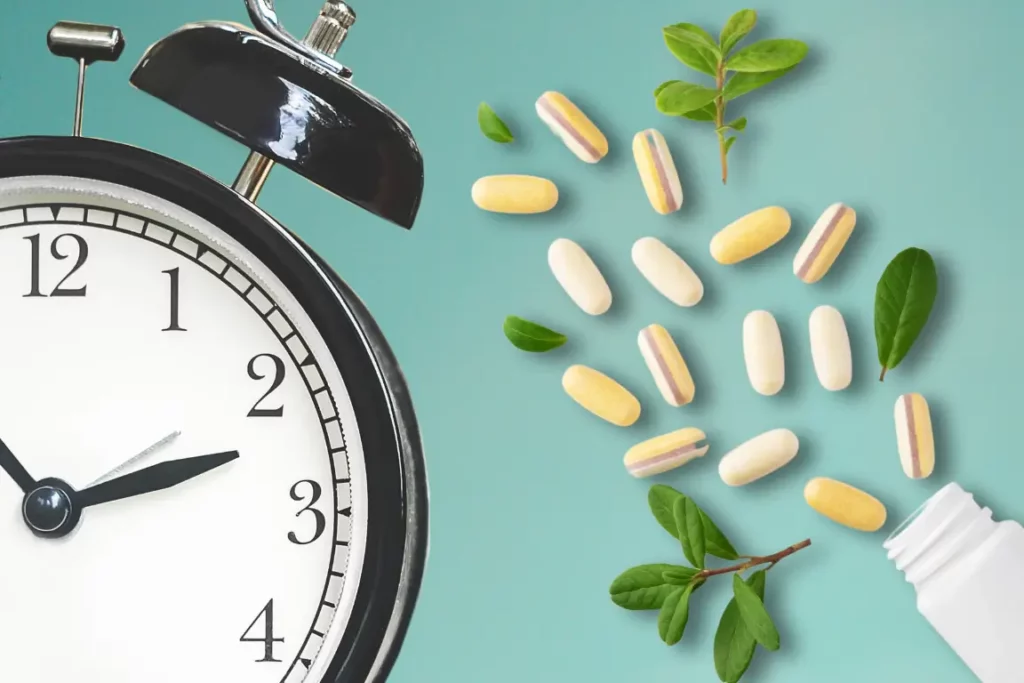A revolutionary new health drink, or just another sugary health risk? Vitamin water is a new beverage that claims to be jam-packed with electrolytes, minerals, and vitamins. However, its actual impact on your health goes beyond the nutritional label on the bottle. This post explores expert opinions, studying this popular beverage's potential benefits and downsides that you might not expect.
What Is Vitamin Water?
Vitamin water is a beverage made of water enriched with vitamins and minerals.
It may also be infused with some electrolytes.
Vitamin water comes in many flavors and is sweetened with sugar or sugar substitutes.
The formulation of vitamin water varies from brand to brand.
Composition Of Vitamin Water
Vitamin water contains:
- Carbohydrates
- Sugars
- Sodium
- Potassium
- Calcium
- Vitamins B and C
- Vitamins A and E (only some)
- Flavoring agents
Not all brands or flavors necessarily contain all these ingredients.
Vitamin Water: Normal vs. The “Zero” Variant
The main difference between the normal and the Zero variants of vitamin water is that the latter has no added sugar.
The Zero variant is sweetened with artificial sweeteners like erythritol and stevia.
So, on average, the normal variant has 100 calories per bottle, while the Zero variant contains 0 calories.
Is Vitamin Water Good For You?
In short, no. Vitamin water is not the best source of your daily vitamins and minerals. Its high sugar content and flavoring agents can also negatively impact your health.
Let’s break down the ingredients and look for the potential benefits of consuming vitamin water.
Ingredients Breakdown
Sugar Content
Coca-Cola put vitamin water on the map.
They offer it in normal and Zero variants.
The normal version contains 26 grams of sugar per bottle.
This is nearly half the recommended daily sugar intake, which is very unhealthy.
The Zero version has no added sugar and is thus a calorie-free drink.
While this is a healthier alternative, it may not be the best choice. We’ll get to the why of it shortly.
Vitamin And Mineral Content
| Flavor | % RDA of Vitamins and Minerals |
| Açai Blueberry Pomegranate | Vitamin C: 50% Vitamin E: 100% Niacin (B3): 25% Pantothenic Acid (B5): 25% Vitamin B6: 20% Vitamin B12: - |
| Tropical Mango | Vitamin C: 100% Vitamin E: 100% Niacin (B3): 25% Pantothenic Acid (B5): 25% Vitamin B6: 20% Vitamin B12: - |
| Power-C Dragonfruit | Vitamin C: 200% Zinc: 25% Niacin (B3): 25% Pantothenic Acid (B5): - Vitamin B6: 20% Vitamin B12: - |
| Focus Kiwi-Strawberry | Vitamin A: 10% Vitamin C: 100% Niacin (B3): 25% Pantothenic Acid (B5): 300% Vitamin B6: 300% Vitamin B12: 300% |
| Essential Orange | Vitamin C: 250% Zinc: 25% Niacin (B3): 25% Pantothenic Acid (B5): - Vitamin B6: 20% Vitamin B12: - |
| Energy Tropical Citrus | Niacin (B3): 100% Pantothenic Acid (B5): - Vitamin B6: - Vitamin B12: - |
| Multi-V Lemonade | Vitamin A: 10% Vitamin C: 100% Calcium: - Magnesium: - Zinc: - |
Please note:
- The % RDA values are approximate and can vary based on specific formulations and serving sizes.
- The values for vitamins and minerals are derived from product descriptions and nutritional information available on the Coca-Cola website and other reliable sources.
- Some flavors may contain additional nutrients not listed here; this table focuses on the primary vitamins and minerals highlighted in the product descriptions.
Health Benefits Of Vitamin Water (only the Zero version)
The sugar content of regular vitamin water negates any health benefits it may offer.
The Zero version may offer some potential benefits.
Convenient Nutrient Boost
The vitamins and minerals in vitamin water may offer some nutritional benefits upon consumption.
Most of it might not be absorbed, but whatever remains could help.
Easy Hydration
People may be more inclined to consume vitamin water due to their attractive flavors.
While it does hydrate sufficiently, plain water is still the best way to hydrate.
Post-workout Recovery
Since vitamin water contains electrolytes like sodium and potassium, it may aid in post-workout recovery.
Potential Health Risks Of Vitamin Water
High Sugar Content
Vitamin water is sweetened with sucrose and fructose in the US.
Fructose is considered the most harmful component of added sugar.
The fructose content in vitamin water is nearly as much as that in normal Coca-Cola.
Risk of Weight Gain and Obesity
Weight loss diets are not just about staying away from high-calorie foods but also saying no to beverages filled with sugar.
Sugar-filled beverages do not even offer the benefits of solid food, like satiety or energy sources.
So they are even worse than sweet-rich foods.
Further, studies suggest that sugar-sweetened beverages are one of the leading causes of obesity.
Excessive Vitamin Intake
Typically, excess vitamins and minerals are excreted via urine.
But if too much is consumed, it can become toxic to the body.
If vitamin water is your only source of vitamins, it might be safe.
You probably shouldn’t consume too much vitamin water along with a diet that contains vitamins.
The vitamins could accumulate and cause some harm to your body.
Is Vitamin Water Good For You? Expert Opinions and Research Findings
Expert Opinions
- Walter Willett, MD, professor of epidemiology and nutrition at Harvard T. H. Chan School of Public Health, explains that “most of the commercial vitamin waters contain sugar or other sweeteners that can be harmful.”
He further notes that they are an expensive way to meet one’s nutrient requirements and recommends drinking plain water and consuming multivitamins, if required. - Uma Naidoo, MD, director of nutritional and lifestyle psychiatry at Massachusetts General Hospital, also highlights a very important aspect of nutrition - "You can’t supplement your way out of a bad diet.”
Research Findings
- A study conducted by researchers from the University of Toronto and Ryerson University examined the nutritional benefits of novel beverages (vitamin waters, energy drinks, and novel juices) sold in Canadian supermarkets. The findings revealed that these beverages often contain excessive micronutrient additions that offer little to no benefit to consumers.
- A study investigated the erosive potential of vitamin beverages on dental health. The results showed that all tested vitamin beverages had low pH levels and high titratable acidity, comparable to Coca-Cola. It concludes that frequent consumption of vitamin beverages may negatively impact dental health and recommends limiting intake.
- A cross-over randomized pilot study compared the absorption of vitamins C, B6, and B12 from a commercial vitamin water and a standardized mixed meal. The results showed no significant differences in maximum concentration for the tested vitamins between both, suggesting that vitamin water provides similar nutrition to the mixed meal but with fewer calories.
Frequently Asked Questions
Can You Drink Vitamin Water Every Day?
It is better to consume vitamin water occasionally rather than every day. Even the zero version may not suit everyone since the sugar alcohol in sweeteners can cause stomach disturbance in some.
Is Vitamin Water Good For Your Stomach?
Vitamin water can benefit stomach health through hydration and electrolyte replenishment. However, its high sugar content and potential for artificial additives may cause gastrointestinal discomfort in some individuals if consumed excessively. For optimal digestive health, plain water remains the best choice, and vitamin water can be consumed in moderation alongside a balanced diet rich in whole foods.
Is Vitamin Water Better Than Tap Water?
No solid evidence suggests that vitamin water is healthier than tap water. There are also not enough studies to investigate the potential benefits that vitamin water may offer.
Can I Replace Regular Water With Vitamin Water?
The average recommended water intake is 3 liters. To replace water and compensate for hydration, one would need to drink ~5 bottles of Coca-Cola’s vitamin water. This can cause various problems:
- Extremely high sugar intake
- High consumption of sugar substitutes
- Vitamin and mineral toxicity
- Too expensive
Are There Any Side Effects Of Drinking Vitamin Water?
Drinking vitamin water can lead to several side effects, primarily due to its high sugar content and potential for excessive vitamin intake.
Many varieties of vitamin water contain significant amounts of added sugars—often comparable to soft drinks—which can contribute to weight gain, obesity, type 2 diabetes, and other metabolic issues.
Additionally, consuming too many vitamins, particularly fat-soluble ones like A and E, can result in toxicity and adverse health effects.
Artificial sweeteners used in sugar-free versions may also cause gastrointestinal discomfort and cravings for more sugar.
Overall, while vitamin water can provide hydration and some nutrients, it should be consumed in moderation to avoid these potential side effects.
Summary: Is Vitamin Water Good For You?
- Vitamin water is a beverage that contains water enriched with vitamins, minerals, and electrolytes.
- It’s relatively new, so it’s important to understand the health benefits and risks of vitamin water.
- Regular vitamin water contains too much added sugar to have any real health benefits.
- A zero-sugar version of the drink can offer some nutritional benefits thanks to its electrolytes.
- The sugar content and excessive vitamin content can be harmful if the drink is not carefully integrated into your diet.
- Experts recommend choosing plain water over other water-based beverages to hydrate.
Others Are Also Reading

How Long Does It Take For Vitamins To Work?

The Link Between Vitamin D And Raynaud's Disease

Can Vitamin D And B12 Deficiency Occur Together?
References
https://www.healthline.com/nutrition/5-reasons-why-vitaminwater-is-a-bad-idea




